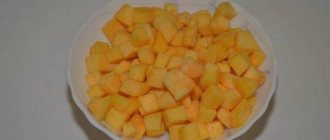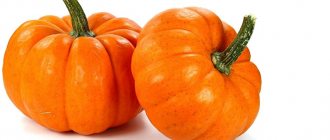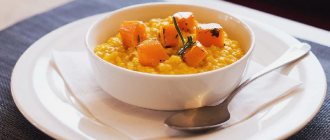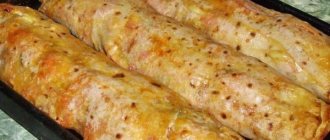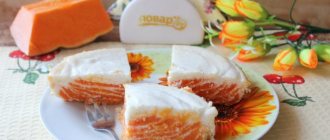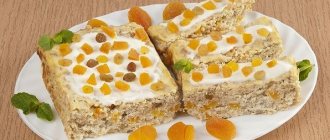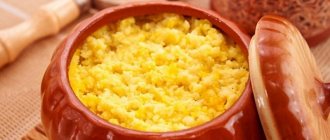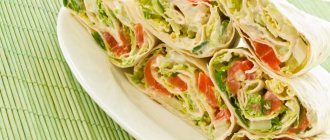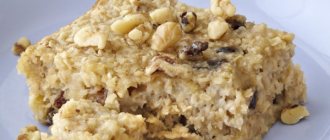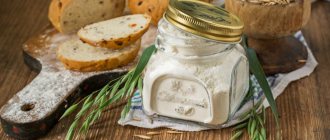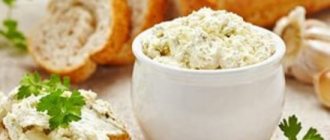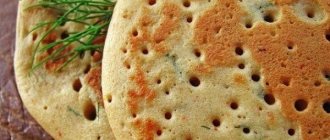1.
Grate 1 kg pumpkin. Squeeze out the juice. Grease a baking sheet with sunflower oil. Add grated pumpkin and distribute evenly.
2. Lavash (25 cm x 40 cm) 5 pcs. Sprinkle with sugar. Roll up the pita bread
roll
. Grease with sunflower oil.
3. Bake in the oven at 180°C for approximately 35-45 minutes. Sprinkle with powdered sugar.
Cooking rules
The dough for vertuta is prepared unleavened. In the traditional version of baking, the dough is kneaded from flour, vegetable oil and water. But some housewives prefer to cook the dough with eggs.
To increase the elasticity of the dough, it is recommended to beat it thoroughly. To do this, you need to take a lump of dough and throw it onto the board with all your might. This operation must be performed within 10 minutes.
The main secret to making vertuta is in preparing and rolling out the dough. The cake needs to be rolled out very thinly, the thickness should not exceed the thickness of a paper sheet, that is, it needs to be rolled out almost to a translucent state.
The filling is placed on the rolled out flatbread, after which the dough is first rolled into a roll, and then the roll is rolled into a snail shape.
The semi-finished product is either baked in the oven or cooked in a frying pan. It is best to serve vertuta hot or warm. The baked goods are cut into sections, like a cake.
Moldavian vertuta with pumpkin in the oven
Tasty, healthy and very inexpensive Moldavian vertuta with pumpkin is an excellent treat for tea.
Dough:
- 320-350 gr. flour;
- 100 ml warm water;
- 1 egg;
- 100 ml vegetable oil;
- 1 pinch of salt.
Filling:
- 1 kg pumpkin;
- 5-6 tablespoons of sugar;
- 2 tablespoons powdered sugar for serving (optional);
- 1 egg for greasing.
Peel the pumpkin, grate it on a fine grater, sprinkle the pumpkin with sugar and mix. To prepare the dough, sift the flour. Mix a raw egg with salt and water, pour 4 tablespoons of vegetable oil into this mixture.
Mix the flour with the liquid component of the dough and stir. First, knead with a spoon, then put the dough on the board and knead with your hands. The dough needs to be kneaded well, it turns out soft and very elastic. Cover the dough with a towel or cling film, let it stand for 20-30 minutes. This is necessary so that the gluten of the flour swells and the dough breaks less when rolling.
You can make one large vertuta from the prepared dough, but it will be difficult, since the dough needs to be rolled out as thin as possible. And it will take a long time to bake a big pie. Therefore, we recommend dividing the prepared dough into 3-4 parts and making several pies.
Roll out part of the dough into the thinnest possible flat cake, then stretch it with your hands. You need to stretch from the center to the edges. The dough is very elastic, but can still tear, so you need to stretch it carefully. Lubricate the prepared layer with vegetable oil.
How to cook “Pita bread with pumpkin in the oven”
Prepare the necessary ingredients.
Pour boiling water over the raisins and leave for 10 minutes.
Add washed and dried raisins, orange zest, sugar and starch to the pumpkin puree.
Stir. The filling is ready.
Grease each pita bread with soft butter. Place the filling on top, stepping back a little from one edge.
Roll up the roll. This way we should have two filled rolls.
Cut each roll into three equal parts and place tightly together in a greased baking dish.
Combine cream with egg and sugar. Pour the cream mixture over the rolls. If desired, the top can be sprinkled with sugar. Bake at 180 degrees for about 30 minutes.
Pita bread with pumpkin is ready in the oven. Cool, cut into portions and serve.
If desired, you can sprinkle with powdered sugar. Bon appetit!
Cooking in a frying pan
You can cook vertuta in a frying pan.
- 1.5 cups flour;
- 1 egg;
- 2 tablespoons of vegetable oil for dough + oil for frying;
- 0.5 glasses of water;
- 2-3 drops of vinegar (9%);
- 400 gr. pumpkins;
- 3-4 tablespoons of sugar;
- 1 pinch of salt;
- 30 gr. butter.
Mix water with vinegar and salt, add vegetable oil and shake. Sift the flour into a bowl, pour in a mixture of water with oil and vinegar, add a raw egg. Mix first with a spoon. When the dough becomes thick enough, place it on a floured board and knead with your hands until you get a soft, elastic dough that does not stick to your hands. Roll the dough into a ball, cover with an inverted bowl and leave for 20-30 minutes.
To prepare the filling, you need to peel the pumpkin and grate it. Add sugar to the pumpkin to taste and stir. Let stand for 15 minutes, then squeeze out excess juice.
Divide the dough into 4-5 parts. We roll out each part very thinly, then stretch it further with our hands. Grease the prepared layers with soft butter. Spread the filling in a thin layer. Then we roll the cake into a roll and pinch the edges very well. If you don't pinch tightly enough, the sweet juice will leak out. We roll each roll in a spiral.
Heat vegetable oil in a frying pan. We lay out the twirls. Fry for 1 minute over high heat, first on one side and then on the other. Then reduce the heat and cook the vertuta under the lid over low heat for 5 minutes on each side.
Vertuta with pumpkin and cheese
Vertuta can also be unsweetened; we will prepare the filling with pumpkin and feta cheese.
- 250 gr. flour;
- 150 ml water;
- 100 gr. butter;
- 70 ml vegetable oil;
- 1 egg;
- 600 gr. peeled pumpkin;
- 150 gr. feta cheese;
- 50 ml brandy (optional);
- 2 teaspoons sugar;
- salt, ground black pepper to taste.
Sift the flour into a bowl, beat in the raw egg and add warm water. Add two tablespoons of butter - vegetable and melted butter. Knead the dough well, it should be soft but elastic enough.
Advice! Professional chefs say that properly kneaded vertutu dough should feel like an earlobe.
Cut the pumpkin into small cubes or grate it on a coarse grater. Simmer the pumpkin in a mixture of butter and vegetable oils for about 10 minutes. Then pour brandy into the frying pan, sprinkle with sugar and add a pinch of salt, continue to simmer until the alcohol evaporates and the pumpkin becomes soft.
Pumpkin baked in the oven in a sleeve - stew with meat and zucchini
Let's start with some solid meals that can feed your family. And although vegetarianism is popular now, according to my observations, there are still more meat eaters. I don’t give up meat either, and in combination with pumpkin it becomes more tender and spicy. Any dish baked in a sleeve will be juicy and soft, just like straight from the oven. Cooking such a dish is a pleasure. I cut it, folded it into a sleeve, put it in the oven and was free.
Ingredients:
- pumpkin (pulp) - 1/2 kg
- zucchini - 2 pcs.
- potatoes - 3 pcs.
- fresh herbs
- seasoning for meat - to taste
- provencal herbs for vegetables
- salt, black pepper - to taste
- You can use any meat in this recipe; pork, beef, and chicken will do. Today we have pork ham. Cut it into cubes, salt, sprinkle with black pepper and your favorite seasonings.
2. First peel the pumpkin, remove seeds and soft fibers. Cut into small cubes, however you like.
3. We also cut the zucchini into cubes. If it is young, with tender skin, then cut it straight with it.
4. Peel the potatoes and cut into thin slices.
5. Place all the ingredients in the sleeve one by one in layers. Potatoes will go down, meat on it, then zucchini and pumpkin on top. We salt and pepper all this beauty. Sprinkle Provençal herbs on top.
We tie the ends of the sleeves and put them in the oven. Bake for 1 hour at 180 degrees. During this time, vegetables and meat become soft and aromatic, and pumpkin adds a very appropriate sweetness to the dish.
You can bake this stew by placing butter or vegetable oil on the bottom. But it is much healthier and no less tasty to cook vegetable stew in its own juice.
As you can see, preparing this dish is not at all difficult, go for it.
Lenten vertuta with pumpkin
If you exclude the egg from the dough recipe, you will get a lean vertuta with pumpkin.
- 500 gr. flour;
- 200 ml warm water;
- 100 ml vegetable oil;
- 1 pinch of salt;
- 1 teaspoon vinegar (9%);
- 1 pinch of soda;
- 1 kg pumpkin;
- 5-6 tablespoons of sugar;
- a few tablespoons of tea leaves for lubrication.
Sift the flour. Add a pinch of salt, pour in vegetable oil. Put a pinch of soda in a tablespoon and add vinegar, pour the quenched soda into the dough. Add warm water. Knead the dough well. It should be elastic and resilient. Let the dough rest at room temperature for about 20 minutes. To prevent the surface of the dough from becoming dry, cover it with an inverted bowl or a clean kitchen towel. You can wrap the dough in cling film.
Advice! If desired, you can add raisins or dried apricots to the filling, it will turn out even tastier.
Clean the dough, grate it on a coarse grater, and squeeze out the juice with your hands. If you plan to add dried fruits, they must first be steamed with boiling water, then rinsed and dried well. Dried apricots need to be cut into pieces. Mix prepared dried fruits with pumpkin.
Divide the prepared dough into 4-5 parts. We roll out each part thinly, and then stretch it with our hands so that the dough is as thin as possible. Spread the filling evenly over the surface of the dough and sprinkle sugar on top to taste. We roll the cake into a roll, and then roll the roll in a spiral, forming a round cake.
Place the twirls on a baking sheet that has been greased with vegetable oil. Lubricate the top of the product with strong tea leaves. Bake for about 40 minutes at 180 degrees.
Recipe: Lavash with pumpkin in a frying pan. Calorie, chemical composition and nutritional value.
Nutritional value and chemical composition of “Pita bread with pumpkin in a frying pan.”
The table shows the nutritional content (calories, proteins, fats, carbohydrates, vitamins and minerals) per 100 grams of edible portion.
| Nutrient | Quantity | Norm** | % of the norm in 100 g | % of the norm in 100 kcal | 100% normal |
| Calorie content | 142.4 kcal | 1684 kcal | 8.5% | 6% | 1183 g |
| Squirrels | 5.1 g | 76 g | 6.7% | 4.7% | 1490 g |
| Fats | 3.6 g | 56 g | 6.4% | 4.5% | 1556 g |
| Carbohydrates | 22.2 g | 219 g | 10.1% | 7.1% | 986 g |
| Organic acids | 0.2 g | ~ | |||
| Alimentary fiber | 1.1 g | 20 g | 5.5% | 3.9% | 1818 |
| Water | 65.6 g | 2273 g | 2.9% | 2% | 3465 g |
| Ash | 1.087 g | ~ | |||
| Vitamins | |||||
| Vitamin A, RE | 171.8 mcg | 900 mcg | 19.1% | 13.4% | 524 g |
| Retinol | 0.038 mg | ~ | |||
| beta carotene | 0.801 mg | 5 mg | 16% | 11.2% | 624 g |
| Vitamin B1, thiamine | 0.1 mg | 1.5 mg | 6.7% | 4.7% | 1500 g |
| Vitamin B2, riboflavin | 0.099 mg | 1.8 mg | 5.5% | 3.9% | 1818 |
| Vitamin B4, choline | 49.98 mg | 500 mg | 10% | 7% | 1000 g |
| Vitamin B5, pantothenic | 0.451 mg | 5 mg | 9% | 6.3% | 1109 g |
| Vitamin B6, pyridoxine | 0.129 mg | 2 mg | 6.5% | 4.6% | 1550 g |
| Vitamin B9, folates | 17.524 mcg | 400 mcg | 4.4% | 3.1% | 2283 g |
| Vitamin B12, cobalamin | 0.056 mcg | 3 mcg | 1.9% | 1.3% | 5357 g |
| Vitamin C, ascorbic acid | 4.19 mg | 90 mg | 4.7% | 3.3% | 2148 g |
| Vitamin D, calciferol | 0.27 mcg | 10 mcg | 2.7% | 1.9% | 3704 g |
| Vitamin E, alpha tocopherol, TE | 0.757 mg | 15 mg | 5% | 3.5% | 1982 |
| Vitamin H, biotin | 2.961 mcg | 50 mcg | 5.9% | 4.1% | 1689 g |
| Vitamin K, phylloquinone | 0.6 mcg | 120 mcg | 0.5% | 0.4% | 20000 g |
| Vitamin RR, NE | 1.8369 mg | 20 mg | 9.2% | 6.5% | 1089 g |
| Niacin | 0.908 mg | ~ | |||
| Macronutrients | |||||
| Potassium, K | 174.78 mg | 2500 mg | 7% | 4.9% | 1430 g |
| Calcium, Ca | 28.88 mg | 1000 mg | 2.9% | 2% | 3463 g |
| Silicon, Si | 16.497 mg | 30 mg | 55% | 38.6% | 182 g |
| Magnesium, Mg | 22.25 mg | 400 mg | 5.6% | 3.9% | 1798 |
| Sodium, Na | 192.99 mg | 1300 mg | 14.8% | 10.4% | 674 g |
| Sera, S | 48.89 mg | 1000 mg | 4.9% | 3.4% | 2045 g |
| Phosphorus, P | 68.6 mg | 800 mg | 8.6% | 6% | 1166 g |
| Chlorine, Cl | 341.18 mg | 2300 mg | 14.8% | 10.4% | 674 g |
| Microelements | |||||
| Aluminium, Al | 26.6 mcg | ~ | |||
| Bor, B | 25.1 mcg | ~ | |||
| Vanadium, V | 70.2 mcg | ~ | |||
| Iron, Fe | 1.284 mg | 18 mg | 7.1% | 5% | 1402 g |
| Yod, I | 3.78 mcg | 150 mcg | 2.5% | 1.8% | 3968 g |
| Cobalt, Co | 2.256 mcg | 10 mcg | 22.6% | 15.9% | 443 g |
| Manganese, Mn | 0.3125 mg | 2 mg | 15.6% | 11% | 640 g |
| Copper, Cu | 150.12 mcg | 1000 mcg | 15% | 10.5% | 666 g |
| Molybdenum, Mo | 7.526 mcg | 70 mcg | 10.8% | 7.6% | 930 g |
| Nickel, Ni | 2.359 mcg | ~ | |||
| Rubidium, Rb | 36.1 mcg | ~ | |||
| Selenium, Se | 5.533 mcg | 55 mcg | 10.1% | 7.1% | 994 g |
| Fluorine, F | 56.03 mcg | 4000 mcg | 1.4% | 1% | 7139 g |
| Chromium, Cr | 2.24 mcg | 50 mcg | 4.5% | 3.2% | 2232 g |
| Zinc, Zn | 0.5032 mg | 12 mg | 4.2% | 2.9% | 2385 g |
| Digestible carbohydrates | |||||
| Starch and dextrins | 19.223 g | ~ | |||
| Mono- and disaccharides (sugars) | 3 g | max 100 g | |||
| Glucose (dextrose) | 1.363 g | ~ | |||
| Sucrose | 0.262 g | ~ | |||
| Fructose | 0.472 g | ~ | |||
| Essential amino acids | |||||
| Arginine* | 0.084 g | ~ | |||
| Valin | 0.082 g | ~ | |||
| Histidine* | 0.036 g | ~ | |||
| Isoleucine | 0.064 g | ~ | |||
| Leucine | 0.115 g | ~ | |||
| Lysine | 0.096 g | ~ | |||
| Methionine | 0.045 g | ~ | |||
| Methionine + Cysteine | 0.077 g | ~ | |||
| Threonine | 0.065 g | ~ | |||
| Tryptophan | 0.021 g | ~ | |||
| Phenylalanine | 0.069 g | ~ | |||
| Phenylalanine+Tyrosine | 0.121 g | ~ | |||
| Nonessential amino acids | |||||
| Alanin | 0.076 g | ~ | |||
| Aspartic acid | 0.131 g | ~ | |||
| Glycine | 0.045 g | ~ | |||
| Glutamic acid | 0.189 g | ~ | |||
| Proline | 0.043 g | ~ | |||
| Serin | 0.099 g | ~ | |||
| Tyrosine | 0.051 g | ~ | |||
| Cysteine | 0.031 g | ~ | |||
| Sterols (sterols) | |||||
| Cholesterol | 65.15 mg | max 300 mg | |||
| Saturated fatty acids | |||||
| Saturated fatty acids | 1.7 g | max 18.7 g | |||
| 4:0 Oil | 0.02 g | ~ | |||
| 6:0 Kapronovaya | 0.03 g | ~ | |||
| 8:0 Caprylic | 0.023 g | ~ | |||
| 10:0 Kaprinovaya | 0.057 g | ~ | |||
| 12:0 Lauric | 0.043 g | ~ | |||
| 14:0 Miristinovaya | 0.189 g | ~ | |||
| 15:0 Pentadecane | 0.001 g | ~ | |||
| 16:0 Palmitinaya | 0.724 g | ~ | |||
| 17:0 Margarine | 0.003 g | ~ | |||
| 18:0 Stearic | 0.269 g | ~ | |||
| 20:0 Arakhinovaya | 0.021 g | ~ | |||
| Monounsaturated fatty acids | 1.091 g | min 16.8 g | 6.5% | 4.6% | |
| 14:1 Myristoleic | 0.029 g | ~ | |||
| 16:1 Palmitoleic | 0.085 g | ~ | |||
| 17:1 Heptadecene | 0.001 g | ~ | |||
| 18:1 Oleic (omega-9) | 0.87 g | ~ | |||
| 20:1 Gadoleic (omega-9) | 0.02 g | ~ | |||
| Polyunsaturated fatty acids | 0.191 g | from 11.2 to 20.6 g | 1.7% | 1.2% | |
| 18:2 Linolevaya | 0.15 g | ~ | |||
| 18:3 Linolenic | 0.017 g | ~ | |||
| 20:4 Arachidonic | 0.012 g | ~ | |||
| Omega-6 fatty acids | 0.2 g | from 4.7 to 16.8 g | 4.3% | 3% |
The energy value of Pita bread with pumpkin in a frying pan is 142.4 kcal.
Primary Source: Created in the application by the user. Read more.
** This table shows the average levels of vitamins and minerals for an adult. If you want to know the norms taking into account your gender, age and other factors, then use the “My Healthy Diet” application.
Vertuta with lavash pumpkin
It is much easier to prepare vertuta from lavash. In this case, you do not have to knead and roll out the dough thinly.
- 2 sheets of thin pita bread;
- 250 gr. pumpkins;
- 50 gr. dried fruits (raisins, dried apricots, prunes - your choice, you can take a mixture of dried fruits);
- 1 teaspoon grated orange zest;
- 50 gr. butter (soft);
- 50 ml cream;
- 1 egg;
- 2-3 tablespoons of sugar.
Peel the pumpkin and grate it. Add sugar to taste. Steam the dried fruits, rinse and dry. Cut large berries, such as dried apricots, into noodles. Add orange zest and prepared dried fruits to the pumpkin.
Melt the butter. Grease the lavash sheets with oil, then spread the filling in an even layer. Roll the lavash sheets into rolls.
But it’s unlikely that you’ll be able to roll pita bread with a snail; it’s too hard for that. Therefore, we simply cut the rolls into several parts so that they fit into the baking dish.
Place the rolls in the mold. Mix raw egg with cream. And grease our rolls with the prepared mixture. We grease several times, we need the mixture to saturate the rolls. Bake at 190 degrees for 20-25 minutes. Ready-made vertutas can be sprinkled with sugar.
